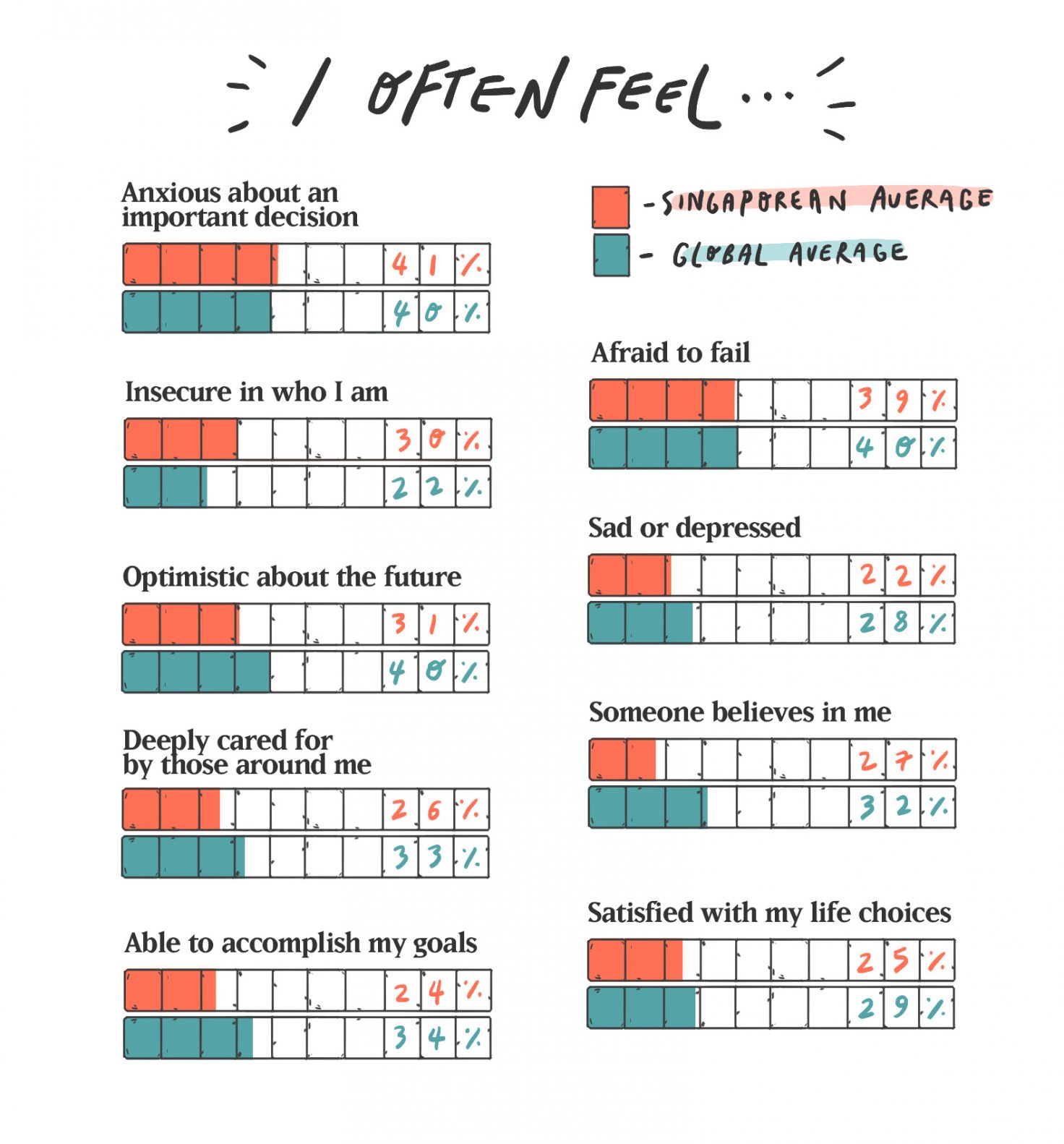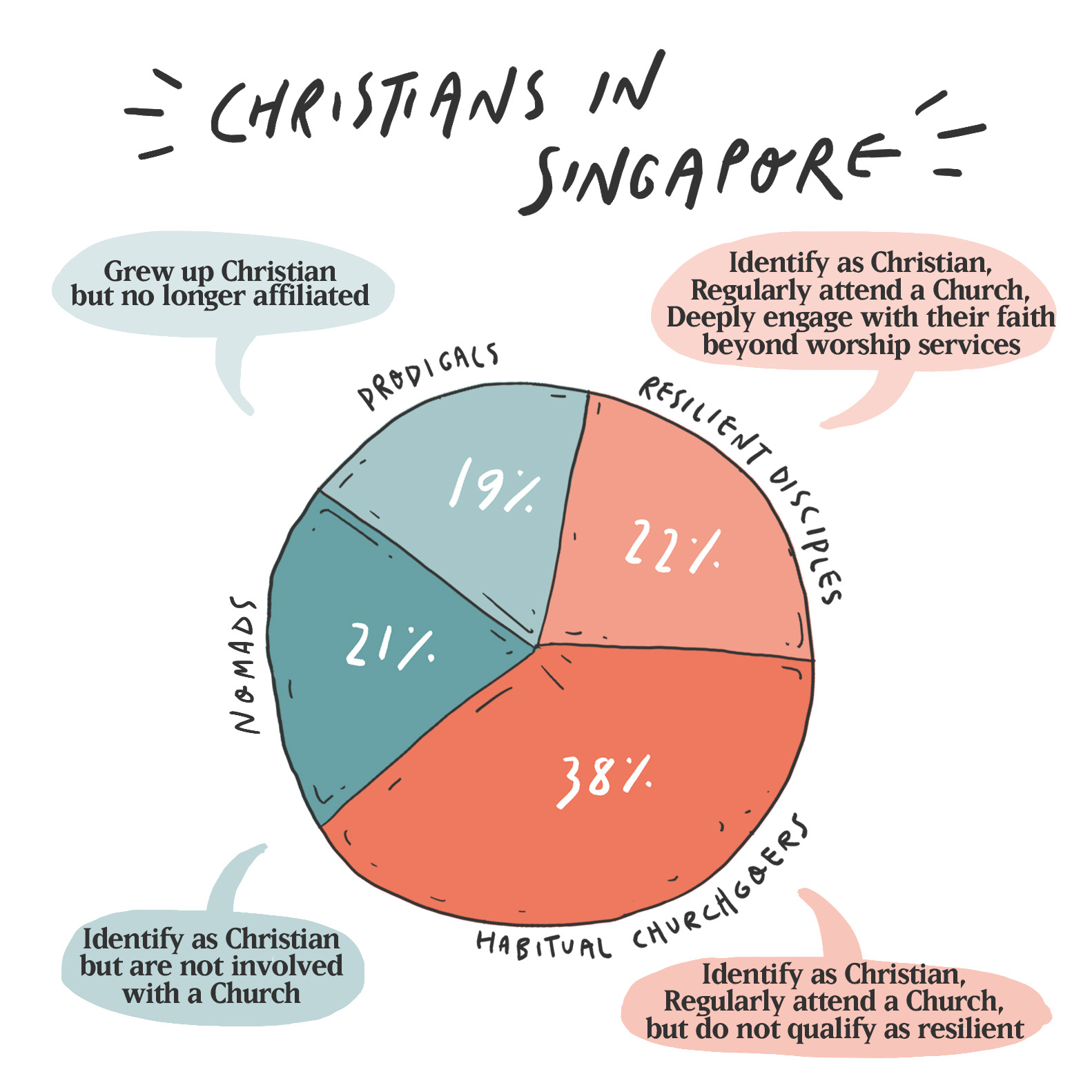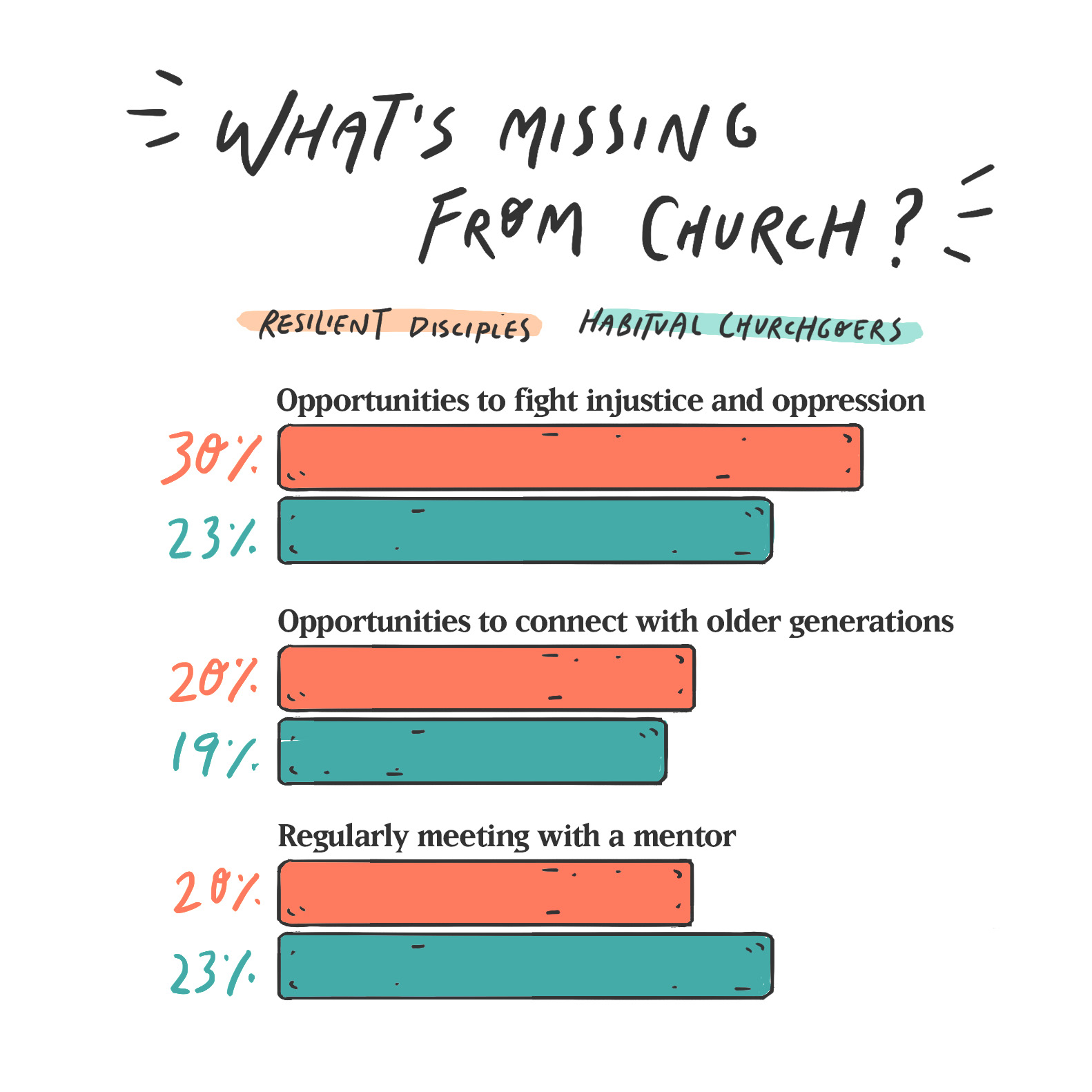“Despite living in a time of relative peace and social mobility, most young adults are not optimistic or empowered about their future.”
This was one of the top-line findings from a global study aimed at understanding “The Connected Generation”. Released last week, Barna and World Vision attempted to identify the values and beliefs millennials and the demographic cohort after them (Generation Z) are bringing into adulthood.
From December 2018 to February 2019, over 15,000 interviews were conducted in over 25 countries. In Singapore, the online interviews were conducted with 500 people aged 18-35 and quota-sampled for representation.
The study sought to test the myth about “anxious millennials” and concluded that the young adults surveyed are “more likely to be feeling negative emotions than positive ones”, said one of the study’s main authors, Daniel Copeland.

The graphic above shows the responses of the Singaporeans surveyed with regard to their optimism about the future (respondents could select more than one response).
These figures are mostly lower across the board as compared to the global averages, suggesting that Singapore’s millennials and Gen Z are less likely to engage with people on a personal level and are more likely to be insecure.
Following this line of logic, it would stand that their “biggest battles are internal ones”, observed Copeland.
It’s not that unexpected. Anxiety or internal turmoil is something that older generations may have a harder time empathising with. After all, for many in the Merdeka, Pioneer and generations before, problems in life were more likely to be external – issues like food, shelter and employment often took precedence.
So when we consider that only fewer than one in three Singaporean respondents feel that someone believes in them or they are deeply cared for by their immediate community, there may be gaps that the Church can fill by sharing the hope and kindness of God.
Copeland said: “This generation is living in the information age. Everything about the world is available at our fingertips. But we often lack engagement with the solutions. The solution is through the Church.”
The Church can indeed step up as a guiding force for young adults who face immediate issues like wanting to buy a home (55%) or getting married (46%). Older Christians who possess multi-generational wisdom have a role to play in cultivating a safe environment where young adults may listen and learn.
As young adults, can we also begin to trust and see that there are older believers who are willing to be our mentors and look to build more cross-generational connections within our churches?
FAITH IN SOMETHING LARGER THAN THEMSELVES
The Barna study also suggests that the majority of young adults in Singapore still believe in the spiritual. Only 3% of local respondents polled did not believe that spiritual forces exist. In contrast, the majority of respondents (82%) were either “certain” that spiritual forces exist (43%) or “think they exist” (39%).
These findings closely parallel what an earlier study on religion found. Figures from that working paper by the Institute of Policy Studies (IPS) revealed that among the young people (18-35 years old), only around 10% did not believe in God. Most believed that there is a God or a higher power.
Indeed, such numbers strongly suggest that religion is set to remain relevant in Singapore despite growing levels of atheism in Singapore, based on the 2015 General Household Survey where 18.5 per cent of Singaporeans identified as irreligious, an increase from 14.8% in 2000.

In the Barna study, young adults were asked what makes them doubt the spiritual. The top two answers were “hypocrisy of religious people” and “science”, with both coming in at just under 30% respectively.
Certainly, education may also be a factor to why science seems to be such a barrier to faith for respondents. Close to 15% of young adults surveyed listed “being better educated” as a reason for doubting the spiritual.
Interestingly, the IPS study also found that 59.6% of those with a secondary school education say God exists without a doubt – compared to only 47% of respondents with a bachelor’s degree.
This suggests that both the Church and young adults in Singapore have roles to play if they are to tear down this false divide between science and faith. Education should enhance faith by helping believers love God with all their minds as well. Doubt and questions can allow for teaching moments and discipleship opportunities that edify young and old together.
“We can show them that doubt is healthy, we can take their doubt and that their doubt is welcome,” said Copeland.
As for young adults who are “stumbled” by the hypocrisy of religious people, the Church can do more to fulfil its call as the beautiful Bride of Christ. With each criticism (fair or not) levied at the Church, comes an opportunity to to express what reconciliation and grace looks like in the Kingdom of God.
FROM RITUALS TO RESILIENT RELATIONSHIPS
Barna categorises Christians in four different ways.
- Prodigals (19%) – Grew up Christian but no longer affiliated.
- Nomads (21%) – Identify as Christian but not involved in a church.
- Habitual Churchgoers (38%) – Identify as Christian, regularly attend a church.
- Resilient Disciples (22%) – Identify as Christian, regularly attend Church, deeply engage with their faith beyond worship services
These statistics suggest that one in five Singaporean Christians are Resilient Disciples. At 22%, this is much higher than the global figure at 13%. This is not cause for celebration, but sober reflection.
If one is a Resilient Disciple, we must recognise that we have a duty and window of opportunity to spur on and help Prodigals, Nomads and Habitual Churchgoers into higher levels of intimacy in their relationship with God and His people.

Consider also that when respondents were asked what the barriers to the Church are for Prodigals and Nomads, the number one response across all four groups was that “faith is more relevant in the hard times of life”.
If such figures are genuinely reflective of the state of faith here, then there are some gaps and failings in discipleship. A relationship with Christ is only real and resilient if it is relevant all the time.
As millennial and Gen Z believers, we need to honestly assess if our faith is something more than just showing up for services and cell groups.
WHAT THE CONNECTED GENERATION YEARNS FOR
When asked what was missing from church, the top factor chosen by both Resilient Disciples (RD) and Habitual Churchgoers (HC) was “opportunities to fight injustice and oppression”, followed by “opportunities to connect with older generations” and regularly meeting with a mentor.
This perhaps reflects just how much this generation wants to feel connected – both to global causes and people within the local church.

Singaporean respondents were also polled by Barna on what fears they had about the future.
- Global climate change (47%)
- Corruption (40%)
- Pollution (34%)
- Natural disasters (32%)
- Wealth inequality (32%)
These may be the very problems that young adults in Singapore want to solve. The internet and social media are right at millennials’ fingertips, and it accounts strongly for this generation’s desire for social justice and the impulse to stay woke.
However, statistics suggest that the Church still has a ways to go with regard to equipping and empowering young adults to effect social justice in the land.
Only 27% of Resilient Disciples and 25% of Habitual Churchgoers affirmed that “my church has helped me better understand social justice”. For both groups, less than half also agreed that the Church has helped them to better understand the “needs of the poor” and the “needs of marginalised people”.
These figures would suggest there is a disconnect between this generation’s social justice impulse and faith in action.
One solution to this may be more churches working towards becoming laboratories and launchpads for the young to impact communities.
In driving such efforts the Church must keep a close eye on growing its leaders and the culture of leadership. Consider that a third (33%) of Singaporean respondents to Barna’s study have never thought of themselves as leaders.
But what safer place would there be for young people to hone themselves as God’s servant leaders? “The Church is the best laboratory for success. It is where they can fail with grace and succeed in love,” affirmed Copeland.
Millennials and Gen Z need mentoring within the Church if they are to succeed and effect righteous change in the land without missing or diluting God’s Great Commission and commandments. To that end, the Church can offer community and connection as it demonstrates faith in action.
As we think on the numbers and figures, let us look to God for a dream. That countless young people would come into our churches and be set alight with the Gospel, making a Kingdom difference everywhere they go.
- What fears do you have about your future?
- If you are a Christian, which of the four categories do you most identify with? Why?
- How can you grow in resilient faith?









